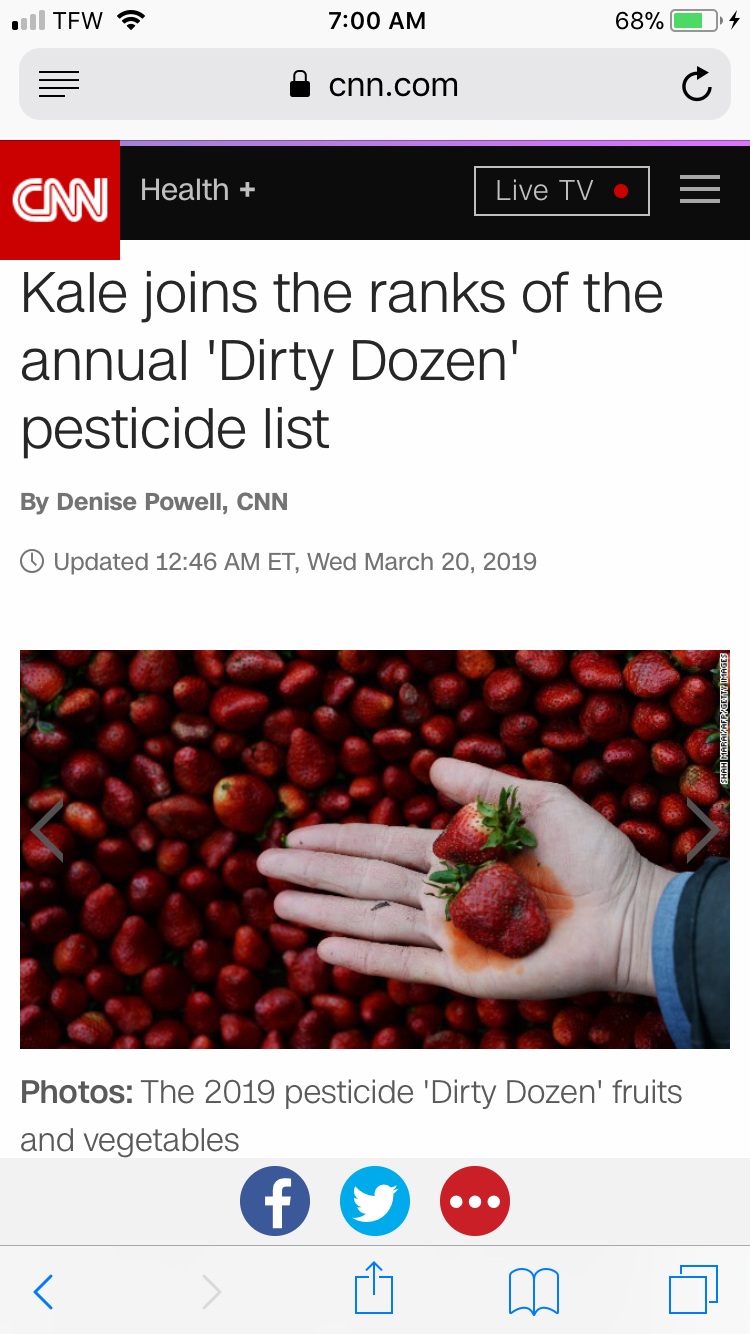|
3/20/19- We NEVER hear about this- almost never. More reason to grow your own food! Do these residual chemicals cause disease and cancer? LINK: https://www.cnn.com/2019/03/20/health/dirty-dozen-pesticide-list/index.html 1. ROUNDUP- best weedkiller/timesaver ever invented. I’ve used it for 45 years. Here is is what I know about it: It is a plant hormone that prevents storage of ATP by photosynthesizing plants, resulting in sprayed plants eating reserves instead- starvation results in sprayed plants. It is only absorbed by leaves- never roots It is “eaten” by microbes in the soil, breaking it down into inert ingredients It does not leach into groundwater- sticking to organic soil particles instead, nor does it runoff into streams. It is not supposed to be applied to plants that you are going to eat- why would you do that? It is not supposed to be bathed in, eaten, inhaled, applied to skin in any way. There is no residual in the soil after the microbes eat it. During droughts, roundup is excruciatingly slow to work as the target plants have gone dormant. Ok, so if you aren’t breathing it/bathing in it/spraying it on plants you are going to eat, then what's the problem? East of the Mississippi River, homeowners can use this product all they want without problems that you hear about in the news. The problem is when large farmers aerial spray crops to kill them for efficient harvests, the chemical is still inside the plant when it’s harvested/processed into beer and bread. Who ever came up with the idea to spray roundup on wheat? Sounds criminal to me. I do not want to eat roundup (brings up an entirely different conversation about chemical residuals in all of our food- what other bad chemicals are we unknowingly eating?). Course, you have a choice- bend over and weed by hand (I do a lot of that when the weeds are close to my veggies), or spray roundup. If it’s sprayed with common sense and logic according to the directions on the label, you have a great tool for your yard. Wanna weed by hand? Go ahead! Have fun! I'm not doing that because the anti-roundup stuff in the news is sensationalized and hyped up WAY PAST any amount of scientific analysis, and every single assault on roundup is met with scoffing and humor by people in my industry- well-educated professionals who really know the facts of this issue. 2. Chemical VS. organic fertilizers:
I never use organic fertilizers! Why you ask? On a MOLECULAR level, the macro nutrients are identical. Nitrogen is either ammonical/watersoluble/water insoluble/urea in both organic and chemical fertilizers. Phosphorous- P2O5- same with both fertilizers Potassium- K2O- same So if, on a molecular level, the molecules are the same, then what’s the advantage of organic over chemical fertilizers? There is none. Again, as a matter of fact, organic fertilizers need to be applied more frequently, don’t last as long, cost more, and are less concentrated (you need more).
Manny
2/7/2020 02:26:17 pm
2. Chemical VS. organic fertilizers: Comments are closed.
|
Archives
July 2023
Categories |
Winter hours-
|
Telephone(203) 261-3926
|


 RSS Feed
RSS Feed